#25. You Sleep If The Baby Sleeps
Before you’re a parent, you practically choose the time when you want to wake up. So let’s say that your work shift starts at 9 AM. In that case, you’ll probably set your alarm at 7:30, so that you have enough time for breakfast, a quick shower, and catching a bus for work. However, when you have a child, your life and your schedules change radically. Your day no longer starts at the time you set your alarm. On the contrary, your toddler will probably wake you up long before sunrise.
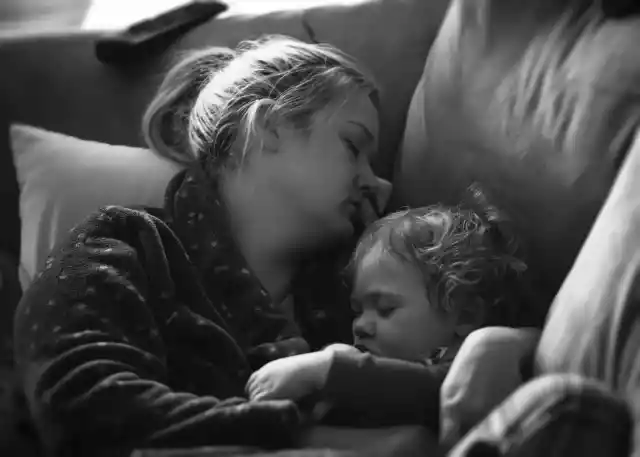
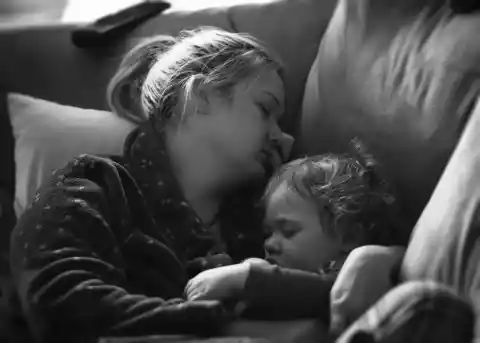
So when you’re a parent, your day lasts as long as your baby is awake. If he or she wakes up at 4 in the morning, you’ll have no choice but to make yourself a quick cup of coffee and make sure the baby’s safe and sound. In turn, your day won’t finish until the little one falls asleep. Sometimes, making him go to sleep is no piece of cake: it can take hours and hours. This is one of the reasons why parents usually feel constantly tired. If you happen to be a parent and felt identified with this, then don’t miss the next reason on my list.
#24. Changes In Your Daily Routines
As we have just seen, being a parent deeply alters your daily schedules. Your day starts the moment your baby wakes up and starts crying. Therefore, in a certain way, you lose control over your schedules: you can’t entirely choose when to wake up when to shower, nor when to have breakfast, lunch and dinner. The same applies to any other activity that you want or that you have to carry out throughout the day.


As a result, one of the many things that parents experience is a complete shift in their daily routines. Raquel D’Apice’s testimony describes how challenging it is to grow used to this whole new life. When interviewed by Huff PostD’Apice explained that after having her baby her day began at 7 in the morning, when she’d “wake up wishing [she]had gone to sleep before 1:00 a.m.”. For Rachel, as well as for millions of other women, growing used to these changes has been exhausting and sometimes even stressing.
#23. Constant Care
Before you’re a parent, you wake up and probably fix yourself some breakfast. After that, you either go to work, go to college, or attend whichever activity you had in mind. In a certain way, your routine is more self-centered. But when you’re a parent, everything changes, mainly due to the fact that there is a baby who completely depends on you. What does this imply? Well, that the second you wake up, you have to start taking care of your baby.


Rachel D’Apice’s testimony helps to prove my point. According to her interview, the first thing she does as soon as she wakes up is to feed her baby a bottle of milk. Only then is she able to fix herself some breakfast. But sometimes she doesn’t even find the opportunity of having breakfast, because after feeding her son, she frequently has to change his diapers. And since the baby usually cries a lot while being changed, she then needs to hold and comfort him until he calms down, which may take quite a lot of time. Like most parents in the world, she needs to be there for her baby literally all the time.
#22. While The Baby Sleeps
Let’s keep on learning about how an ordinary day in Rachel’s life is. After feeding her son and attempting to grab a bite herself, she puts him down for a nap. Sometimes, the baby doesn’t feel like sleeping, so the two of them go sit in the living room to play with some toys. But if she does manage to put the baby to sleep, this doesn’t necessarily mean that she’s free to take a nap herself. On the contrary, most often than not, she must seize the moment and make some time to tackle her personal to-do list while her baby rests.


On the day she was interviewed by HuffPost, as soon as her son had fallen asleep after breakfast, she did a “full load of laundry and [ran the]dishwasher, schedule[d]four doctor appointments and one pediatrician appointment and two dentist appointments and [paid]several bills online“. So basically, since many of the everyday chores must be performed while the baby is asleep, parents must learn how to optimize their time. And obviously, they usually have little or no time to rest throughout the day. So how can they not feel exhausted?
#21. Fluctuating Routines
Most of the stay-at-home parents’ days follow a similar pattern. They wake up, feed their babies, comfort them if they cry, and perform everyday chores as soon as they go to bed. However, life with a baby is extremely unpredictable. Some days, the baby may not feel like sleeping throughout the whole day, in which case the parent will have no chance of accomplishing the daily chores. So the dishes will remain unwashed, the bills will remain unpaid, and the bed will remain undone.
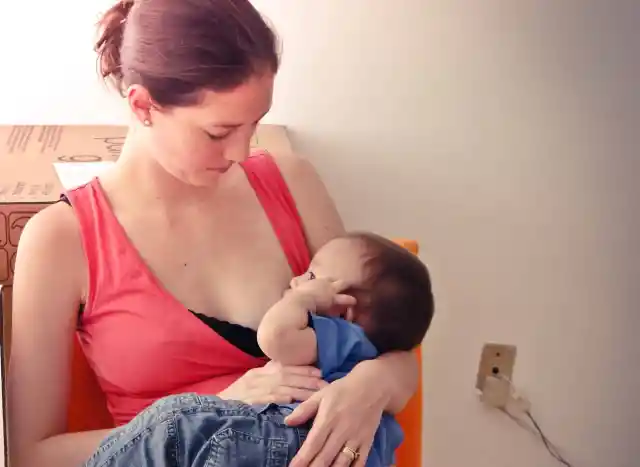
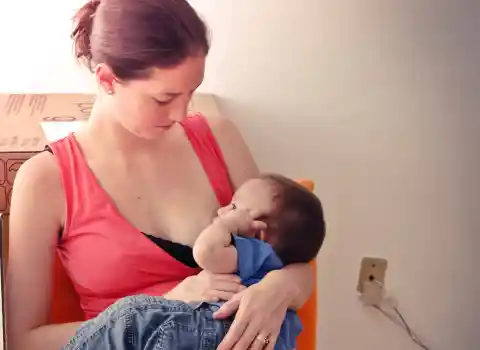
In other words, each parent’s struggles will be different, and so will their routines. Some may have a rough time putting their babies to sleep after feeding them, in which case they’ll have far less time for other everyday activities. But at the same time, it’s important to understand that a baby’s sleep doesn’t always follow a regular pattern: one day they might sleep all morning until noon, while the next day they may be fully awake all day. Every parent must learn how to deal with that unpredictability, and adapt to changing circumstances and shifting routines.
#20. Kissing Rest Goodbye
However, changing daily routines are only one of the many reasons why parents usually feel exhausted all of the time. As a matter of fact, parents usually end up growing used to functioning despite their lack of rest. At least this is what Christine Skoutelas expressed when delving into the issue for Huff Post.
”I’m quite sure that it is a scientific fact that parents never feel like fully functional human beings again. Or maybe they just change the definition of what ‘fully functional’ means, so that it no longer implies anything closely related to ‘rested’,” Christine stated in her interview.
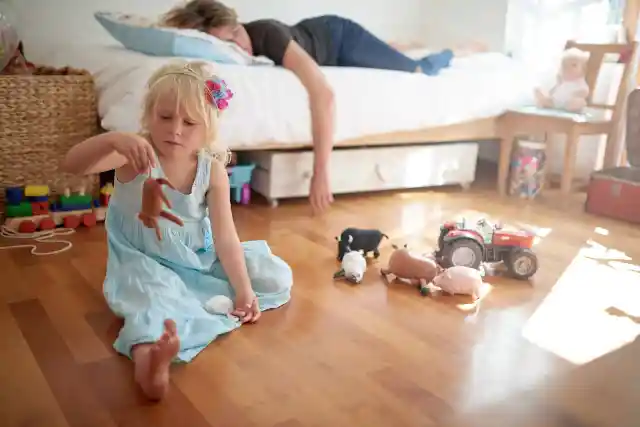

So according to Christine, even though it’s hard to get through the day without any rest, parents usually grow used it. They get accustomed to sleeping in two-hour periods instead of having an eight-hour-long rest. They grow used to feeding their babies, changing their diapers and making them stop crying, without being fully rested themselves. So even though it’s true that parents usually feel exhausted, the lack of sleep or the irregular sleeping patterns is only one of the many motives.
#19. Having Patience
It is clear that parents don’t have much spare time when they have kids. Especially when they have more than one child. And if their kids have wide age gaps, then it’s even worse! As Christine explains, taking care of children of different ages makes it difficult to complete even the smallest of tasks.
“The other day I tried to program my cousin’s number into my phone… I tried about eight times before giving up completely because my children were all up in my space, bumping my arms and touching the screen“, Christine told HuffPost.


This means that raising more than one child demands a great deal of patience. Even the simplest of things -such as charging your phone, sending a text message or going to the bathroom – may be difficult to achieve. Because as soon as one kid stops crying, the other one needs his diaper changed; and as soon as you’ve dealt with the diapers, the third one wants to play some games with you. And so on and so forth. Maintaining one’s patience when dealing with simple and menial tasks whilst taking care of your children can be very, very exhausting.
#18. Non-Stop Responsibility
Throughout the 20th century, practically all the countries in the world have introduced working time laws and regulations, most of which establish that making someone work for more than 48 hours a week is illegal. But imagine working more than that. Imagine working 16 or even 20 hours a day. Is that even physically and emotionally possible? Well, that’s pretty much what being a parent is like.


From the moment your kid is born, you’re a parent 24-7, and taking care of your children becomes a non-stop responsibility. Besides, children are usually active all day long. So it’s not like you can take a lot of breaks throughout the day. As Christine clearly states, “There are no days off“. And if you’re a parent who also has a job, it’s hard to even imagine how hard and tiring that must be. If you happen to be a parent and felt identified with this, then
you’ll probably agree with my next point as well!
#17. No Sick Leave
Continuing with the previous analogy, another of the working rights conquered throughout the 20th century has been sick leave. If someone is sick, he or she has the right to be absent from work until achieving full recovery. But when you’re a parent… well, as I have already stated, it’s a non-stop responsibility. Even when you’re sick.


So whenever you’ve caught a fever or picked up a cold, there’s no way of calling in sick. You still have to perform your everyday parenting duties. Of course, your wife or your husband can help, or if you’re lucky enough, someone else may come to aid you. But even in those cases, it’s still a challenge.
“Being sick is the worst, because you can’t be sick. At least, you can’t act like it”, Christine told HuffPost.
#16. Physical Exhaustion
Being a parent can also be physically exhausting. But in this particular aspect, parenthood is not as demanding for men as it is for women. After all, we can’t deny that pregnancy asks a lot of a woman’s body: nausea and fatigue are just some of the many symptoms produced by pregnancy, not to mention the physical changes that women undergo. However, pregnancy is barely the beginning of it.


After the baby is born, taking care of them can be tiring. When they’re still toddlers, parents have to hold them and carry them on their arms from one place to another all day long. Doing this can be exhausting, especially for your arms and your back. And when you have more than one kid, things get even more tiring.
“For the first few years, parents are constantly carrying their kids around, lifting a 35-pound toddler on one hip, and a 20-pound toddler on the other“, Christine said to HuffPost.
#15. Mix Of Emotions
There is no doubt of the fact that becoming a parent is a life-changing experience. But not only because of the fact that it alters your schedules and daily routines, but also because of the sudden contrasting rush of emotions that it triggers. At times you will feel blissful and cheerful; at other times, you’ll feel emotional and sensitive; while in some cases, you’ll probably feel stressed, worn out and irritated.


Coping with such contrasting emotions is difficult, especially during the first years when your child demands constant care. And processing these different feelings can be quite exhausting.
“Motherhood is more than I ever imagined. It’s more exciting and more terrifying; more rewarding and more draining; easier to figure out yet totally confusing“, Stephanie Thomas wrote for Parenting.com.
#14. Constant Cleaning
Being a parent not only requires constant care and attention. It also requires constant cleaning. This may seem something simple, but it’s actually not. When it comes to babies or toddlers, we must not forget that they constantly throw up, usually all over their clothes. When they do so in large amounts, one must not only bathe the baby but also wash their clothes. If you don’t do it quickly, they may grow a bad smell on them.


So when you have a baby, you constantly have to keep on changing their clothes, either because they throw up, or because of the mess they make when eating or playing. So parents must put a great deal of effort into guaranteeing their children’s hygiene. But this is not all. If you find this stressing, then wait until you read what’s coming up next!
#13. Keeping The House In Order
Cleaning your kids’ clothes is definitely both a dull and demanding job. But it doesn’t end here: the house also needs constant attention. A day in the life of any parent usually involves picking up toys, putting things in their right place, doing laundry, washing the dishes, cleaning things that the children spill and fixing or throwing away the things that they break. But these are only a few examples: the whole list is endless.


But keeping the house in order is quite a challenge when there’s a baby or a toddler in the house, mainly because they’re not yet aware of the consequences of their actions. In other words, it’s still impossible to make them understand the concept of cleaning and order. As a result, as Christine said, “The amount of frenetic cleaning of bodies and houses that parents end up doing is mind-boggling“.
#12. As Kids Grow Older
But keeping the house clean and tidy isn’t only a problem with babies. When kids get older, they start making bigger messes, and the task of cleaning becomes even more tiring. So as they grow up, children become experts in finding ways of disorganizing or dirtying the house. For instance, drawing in the walls is a classic.


It’s obvious that it’s difficult to keep things tidy when you’re kids are yet too small to understand the concept and the importance of tidiness. However, according to Christine, things get even worse when they’re teenagers.
“As kids get bigger, so does their stuff. Teenagers have more surface area than toddlers, which means more dust, more circles around the tub. And definitely more clothes on the floor“, Christine told HuffPost.
But if you think that the amount of cleaning and the lack of sleep constitute the main reason for parents’ constant sense of exhaustion, you’re wrong. Check out the next slide to discover what one of the main reasons is.
#11. Overthinking
Several pieces of research have shown that the constant lack of sleep is not the main factor when explaining why parents are always so exhausted. Nor are most of the factors previously pointed out. In fact, many studies have proven that one of the main explanations to the level of exhaustion that parents tend to have lies upon the amount of time that parents spend thinking.


Overthinking is usually a problem when your kids are not around. So when parents go off to work while their kids are either back home or at kindergarten, it’s common for them to grow increasingly paranoid. Suddenly, they picture all types of fateful scenarios: “What if he gets sick? What if he can’t sleep? What if he misses me and doesn’t stop crying? What if he doesn’t want to eat the food they give him?”. These are only some among many common thoughts that usually keep parents worried. And the amount of stress that these feelings provoke leads to exhaustion.
#10. Constant Fear
When people become parents for the first time, it’s common for them to feel worried, afraid or even paranoid about very simple things. For instance, a silently sleeping baby usually arises fear in new parents. If the baby oversleeps, they suddenly think that something’s wrong with them; if the baby comes out in a rash, they start picturing the worst of the diseases.
“At first, parents wake up in a panic when the infant doesn’t wake them up, and they check on them, adrenaline rushing, thinking they’re going to find something very wrong“, Christine says.


So let’s imagine that a couple with scarce parenting experience is worried because they notice that their baby is sleeping more than usual. They’ll probably poke him to see if he reacts, just to make sure that he’s OK. But once they make sure there’s nothing wrong, they’ll probably have a hard time going back to sleep, mainly because of all the adrenaline that they initially felt. This series of events usually repeats itself over and over again. And feeling constant fear sure wears you down.
#9. Double Shift
Many parents have part-time or full-time jobs. Obviously, being both a worker and a parent can be exhausting. In such cases, when parents arrive home after working all day, they must still continue working. People call this the “second shift”, or the to-do list that must be completed when someone returns from a long day at work.


So if people tend to arrive home feeling tired after a regular work shift, imagine how exhausting it is to be a parent! When a parent gets home after work, they must spend time with their kids, play with them, and prepare their supper. If they’re still too young, you need to help them get changed and bathe them as well. And when they’re older, you must make sure that they do their homework and that they behave properly. To be honest, every age presents its own challenges, and all of these challenges are equally exhausting.
#8. Doubling Your Income
It is obvious that everyone – or almost everyone – in the world has to work in order to earn a living. Paying rent, paying the bills, and keeping your fridge full requires hard work and dedication. However, when you have children, expenses may double or triple. Special non-fat milk, medicines, vaccines, doctor appointments, diapers, clothes, toys: these are only some of the millions of things in which you have to spend money on.
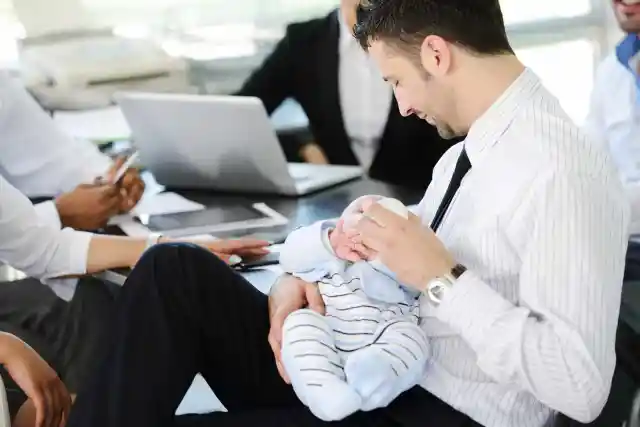
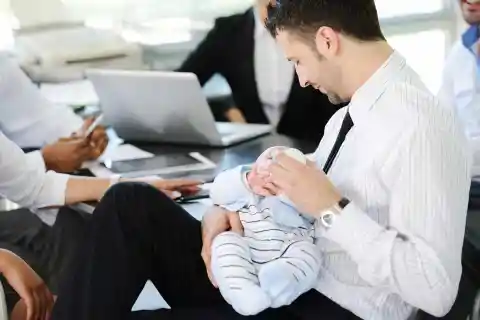
What is my point? That not only does raising a child require an awful lot of work at home. Apart from this, it also requires putting even further effort into your job, in order to meet all the expenses that raising a child entails. Now it seems pretty clear why parents are always exhausted, doesn’t it?
#7. Mental Load
Many parents feel constantly stressed either because they worry all the time about everything, or because they keep having fearful thoughts over and over again. Parents who go through this suffer from what is known as mental load.


Mental load is a feeling that is actually backed up by science; in fact, plenty of research regarding this has been made since 1996, when sociologist Susan Walzer’s article Thinking About the Baby was published. According to her writings, mental loads can provoke deep emotional and psychological consequences. Considering how common it is, it’s something that shouldn’t be underestimated at all. If you want to know more about Walzer’s findings regarding this issue, then keep on reading!
#6. Women Versus Men
Walzer began her research on the topic of mental loads by conducting a great deal of interviews with parents who had babies less than two years old. After carrying out and analyzing her fieldwork, she discovered that women were more prone to suffer from mental loads than men. But what was the reason for this?


According to Walzer, her fieldwork analysis had proven that women ended up handling most of the emotional and mental work involved in taking care of a newborn child. Thus, the level of exhaustion and stress was usually higher in mothers than in fathers. Apart from this, she also concluded that women learn more and process more information than their male partners. For example, women are more likely to search for the right pediatrician for their babies. But this is
not all! Keep on reading to find out about the rest of her discoveries.
#5. Matriarch Households
On top of this, Walzer found that women worry more than their spouses. They usually feel more anxious about their parenthood-centric responsibilities. Besides, according to Walzer, there are many details which men aren’t usually bothered by, but women are: for example, finding the right doctor, or buying the right brand of milk for their children.


Walzer also noted that mothers were the ones who typically took charge of organization as well as delegation. In most of the interviewed parents, it was usually the mother the one who knew what to make for dinner each night and the one who kept track of simple household tasks, such as regular mattress rotation. Even if their husbands helped, it would be the wives who would indicate what they needed to do. And of course, assuming greater responsibilities
has a price: in this case, greater exhaustion.
#4. Mothers In The 21st Century
Historically, men spent a proportionally longer period taking part in paid work than women. This has mainly been a result of the sexist way of conceiving men’s and women’s roles: many people believed that women were supposed to be in charge of raising the children and taking care of the house, while it was the men’s duty to earn a living for the whole family. However, according to Walzer, this has gradually begun to change, and the number of hours that men and women put into both paid and unpaid positions are becoming more equal.


But according to Walzer, even though more mothers take part in paid jobs, the rest hasn’t changed: in most cases, they still continue to do more of the thinking, organizing and delegating than their partners. All of this requires a great deal of effort, time and work, which helps explain why mothers are usually even more exhausted than fathers.
As Lisa Wade wrote for Money magazine, “Like much of the feminized work done more often by women than men, thinking, worrying, paying attention, and delegating is work that is largely invisible, gets almost no recognition, and involves no pay or benefits.”
#3. The Importance Of Free Minds
According to Lisa Wade, the mental load that most mothers put up with sheds light on the fact that a lot has to be done in order to reach true gender equality. This means that the effort put into dealing with parenthood responsibilities must also be shared.
“We have come a long way toward giving women the freedom to build a life outside the home, but the last step may be an invisible one, happening mostly in our heads,” Wade wrote.


So according to Wade, to be truly free, we need to free women’s minds as well. Of course, someone will keep having to remember to buy toilet paper or to remember which milk brand the pediatrician recommended. But if that work isn’t shared by fathers and mothers, then women will continue carrying this burden. But as long as they do, it’s obvious that women will keep on feeling exhausted most of the time.
#2. Sharing Your Thoughts
According to Wade, women could start reducing some of that mental load by sharing their thoughts with others, especially to their partners. But according to her, while women tend to constantly worry about tons of everyday issues and tasks, most of the time they keep these thoughts to themselves.


Therefore, parents’ exhaustion is also caused by a lack of communication and a lack of sharing between parents. And as we have seen, mothers are the ones who carry most of this burden. So two things are necessary for things to be more balanced: women should open their minds, and men should be more empathetic.
“How about the next time a spouse, or friend, or family member asks, ‘What’s on your mind?’ you tell them. Lighten the load. Even if just for a minute,” Wade wrote on the Internet blog ScaryMommy.com
#1. Lack of Networks
After all the things I’ve mentioned, it’s obvious to state that raising a kid demands a great deal of effort and sacrifice. But it is equally obvious that nobody can do this alone, with no help at all. That is why mothers should reach out to and support other mothers since they can easily understand what each other is going through. But don’t get me wrong: fathers should do this too!


So if mothers can count on their friends for help, they might feel a little less of a mental load and, therefore, at least a tiny bit less exhausted. Thus the importance of creating networks and relying on other people for help. After all, it’s physically and emotionally impossible to raise a kid completely on your own with no help at all.